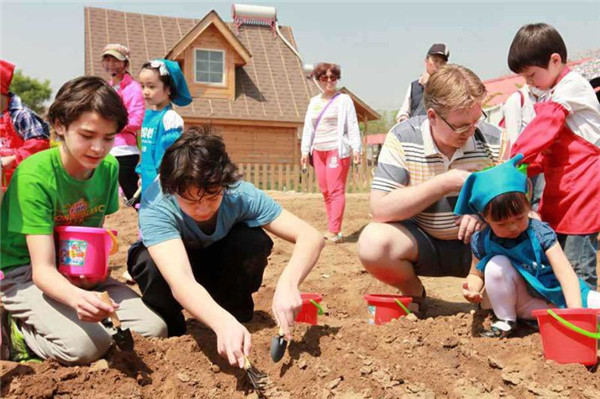Urban dwellers get a chance to grow their own food
By Liu Zhihua ( China Daily ) Updated: 2016-07-16 07:38:39
 |
|
Children learn how to farm during a school activity on a farm in suburban Beijing. [Photo provided to China Daily] |
Health scandals in China in recent years that have made millions of people wary about the food they buy have created at least one other breed: city dwellers who rent plots of land to grow their own food and who can boast of having their own little piece of the good life.
But many of these city farmers have realized that the attraction of getting back to basics also has its unattractive sides, such as the hard, usually thankless, work needed to successfully grow crops. The result is that many plots have fallen into disuse and many of the formerly enthusiastic farmers have moved onto other interests.
However, there are cases of these farms being turned into thriving ventures. One such is Yifendi Farm, a cooperative run by Nanyuan Village in the Fengtai district of Beijing, set up in 2009.
The allotment, one of the first in Beijing and one of the biggest, covering more than 90,000 square meters, is divided into 500 allotments of 66 square meters for renting.
In 2011 it established another area of more than 100,000 square meters that was given the name Little Town Farm, not far from Nanyuan Village and divided into 400 allotments of 36 square meters each.
Apart from a restaurant, the farm has also built dozens of wooden houses for people to stay over, and game centers where children can play with farm animals, including peacocks, chickens and horses.
"People love farming, and there will always be a need for these things," says Shang Jincheng, an executive with the farm. "For a farm to retain customers the main thing is that it treat them well."
The two farms are very close to the city, which is a big advantage, he says, adding that tap water, farming tools, organic fertilizers and technician advice for customers is available free of charge.
Most of those in the two farms are loyal customers who have rented plots since it opened, Shang says.
|
|
|
|
|
|
|
|

























 Raymond Zhou:
Raymond Zhou: Pauline D Loh:
Pauline D Loh: Hot Pot
Hot Pot Eco China
Eco China China Dream
China Dream China Face
China Face






